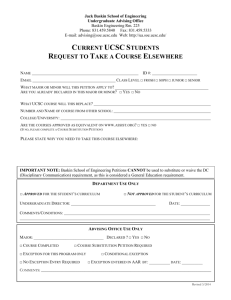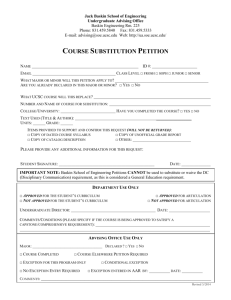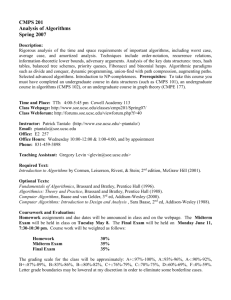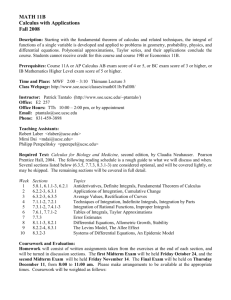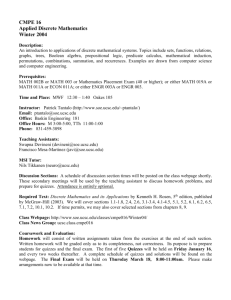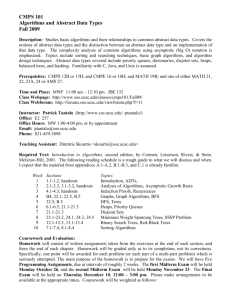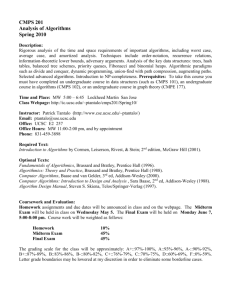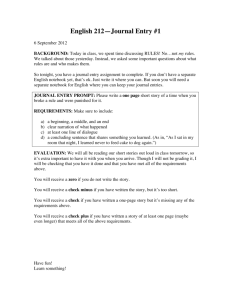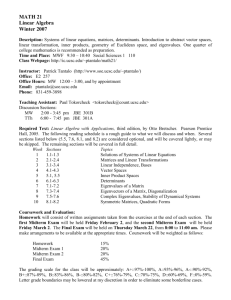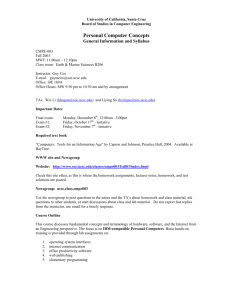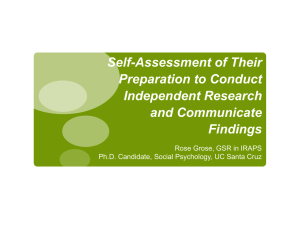index
advertisement
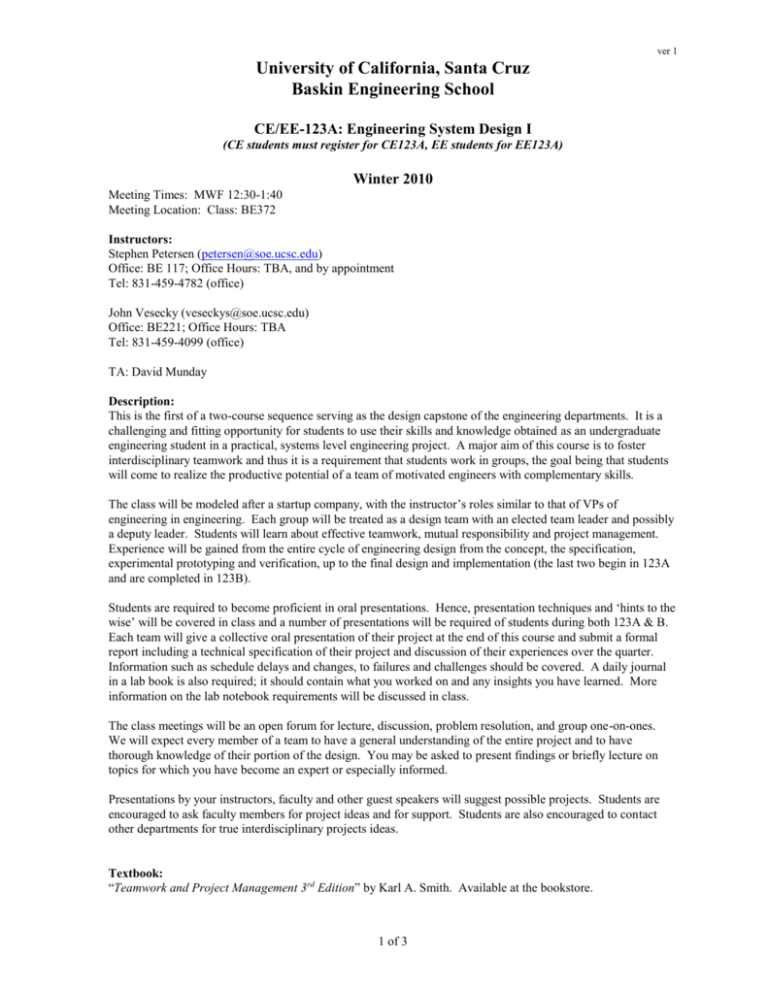
ver 1 University of California, Santa Cruz Baskin Engineering School CE/EE-123A: Engineering System Design I (CE students must register for CE123A, EE students for EE123A) Winter 2010 Meeting Times: MWF 12:30-1:40 Meeting Location: Class: BE372 Instructors: Stephen Petersen (petersen@soe.ucsc.edu) Office: BE 117; Office Hours: TBA, and by appointment Tel: 831-459-4782 (office) John Vesecky (veseckys@soe.ucsc.edu) Office: BE221; Office Hours: TBA Tel: 831-459-4099 (office) TA: David Munday Description: This is the first of a two-course sequence serving as the design capstone of the engineering departments. It is a challenging and fitting opportunity for students to use their skills and knowledge obtained as an undergraduate engineering student in a practical, systems level engineering project. A major aim of this course is to foster interdisciplinary teamwork and thus it is a requirement that students work in groups, the goal being that students will come to realize the productive potential of a team of motivated engineers with complementary skills. The class will be modeled after a startup company, with the instructor’s roles similar to that of VPs of engineering in engineering. Each group will be treated as a design team with an elected team leader and possibly a deputy leader. Students will learn about effective teamwork, mutual responsibility and project management. Experience will be gained from the entire cycle of engineering design from the concept, the specification, experimental prototyping and verification, up to the final design and implementation (the last two begin in 123A and are completed in 123B). Students are required to become proficient in oral presentations. Hence, presentation techniques and ‘hints to the wise’ will be covered in class and a number of presentations will be required of students during both 123A & B. Each team will give a collective oral presentation of their project at the end of this course and submit a formal report including a technical specification of their project and discussion of their experiences over the quarter. Information such as schedule delays and changes, to failures and challenges should be covered. A daily journal in a lab book is also required; it should contain what you worked on and any insights you have learned. More information on the lab notebook requirements will be discussed in class. The class meetings will be an open forum for lecture, discussion, problem resolution, and group one-on-ones. We will expect every member of a team to have a general understanding of the entire project and to have thorough knowledge of their portion of the design. You may be asked to present findings or briefly lecture on topics for which you have become an expert or especially informed. Presentations by your instructors, faculty and other guest speakers will suggest possible projects. Students are encouraged to ask faculty members for project ideas and for support. Students are also encouraged to contact other departments for true interdisciplinary projects ideas. Textbook: “Teamwork and Project Management 3rd Edition” by Karl A. Smith. Available at the bookstore. 1 of 3 ver 1 Evaluation: Your performance in this class will be based on the following general areas: 1. Ability to apply the fundamentals of system design to a particular project while working as part of a group, including: a. Exercising judgment and independence in creating a project with clearly defined specifications and achievable goals b. Creating a realistic schedule with target milestones c. Demonstrating competence in describing your project goals and specifications d. Doing independent research to determine viable components, showing the ability to comprehend data sheets and application notes e. Participating in peer group design reviews of each person’s work 2. Demonstrating independence and self-motivation in mastering new topics necessary to successfully complete a project, including new EDA and CAD tools. 3. Presenting course and project material to the class. This includes the quality of the slides, professionalism of the presentation and creativity of the delivery/slides. 4. Demonstrating technical competence in related hands-on experimental laboratory work. This would include competence using all applicable laboratory equipment such as oscilloscopes, spectrum analyzers, RF network analyzers, DVM, waveform generators, etc. 5. Formal group final presentation and written report with technical specification of project. 6. Attendance in class and completion of assignments and readings. 7. Quality and detail of laboratory notebook. 8. Ability to work effectively as a team. Your teammates evaluation of you will have a significant affect on you letter grade. Letter grades will be assigned for all work. Final grades are arrived at by summing weighted grade points and converting back to a letter grade as follows: 1. Written assignments 25%, where each assignment is weighted equally. 2. Presentations 75%, with this grade divided equally among two group presentations and the final team report. Each of the two presentations will be graded in four areas : Individual delivery 25%, personal grade Quality of slides 25%, group grade Quality of content 25% group grade Group presentation 25% group grade Laboratory: To accomplish the task of coming up with a project, evaluating its feasibility, and designing and prototyping it students are being given the privilege of unlimited and unsupervised lab access. This includes the use of laboratory equipment (computers, printers, scopes, etc) and resources (web-access, email, ftp, etc) in a responsible and respectful manner. Any abuse of equipment or misuse of resources will result in the immediate loss of these privileges, and may result in disciplinary action by the University. The University rules regarding academic integrity will be enforced in all aspects of this course. Lab support will be provided by the Baskin Engineering Lab Support Group (bels@soe.ucsc.edu). Please report immediately any problems pertaining to the laboratory to them, they are also an excellent resource for parts. It is expected that you will keep the lab clean and orderly and respect other group’s equipment and space. The lab space is reserved for student enrolled in the class only. It is not a place for your friends to hang out. Please report any misuse immediately to the instructors. BELS will install any special software or hardware that you acquire and need. The instructors will also have root access on the computers and can install any required software needed in an emergency. In some cases students can be give local root access to the machines. 2 of 3 ver 1 Laboratory notebook: In keeping with standard industrial practice, students will be required to create a suitable engineering notebook (see separate handout for details). A nice lab notebook is available from: http://www.bookfactory.com/lab010.html. Staples and Office Max also have good laboratory notebooks. The UCSC bookstore may have some also. Academic Integrity Anyone caught cheating in the class will be reported to their college provost (see UCSC policy on academic integrity) and may fail the class. Cheating includes any attempt to claim someone else's work as your own. Plagiarism in any form (including close paraphrasing) will be considered cheating. Use of any source without proper citation will be considered cheating. If you are not certain about citation standards, please ask, as I hate having to fail students because they were improperly taught how to cite sources. Collaboration without explicit written acknowledgment will be considered cheating. Collaboration on lab assignments with explicit written acknowledgment is encouraged—guidelines for the extent of reasonable collaboration will be given in class. Classroom Accommodations for Disabilities If you qualify for classroom accommodations because of a disability, please submit your Accommodation Authorization from the Disability Resource Center (DRC) to the instructors during my office hours in a timely manner, preferably within the first two weeks of the quarter. Contact DRC at 459-2089 (voice), 459-4806 (TTY). 3 of 3
